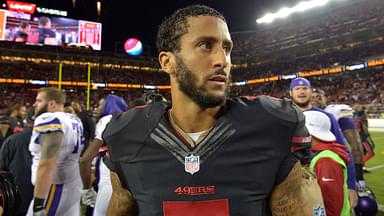Colin Kaepernick shook not just the NFL, but the entire world in 2016 when he and a few of his San Francisco 49ers teammates knelt during the national anthem before a preseason game. It was meant to be a peaceful and symbolic protest against police brutality and racial injustice. The powerful statement quickly captured global attention.
Advertisement
His actions inspired similar protests across the league, with many players choosing to kneel or raise their fists during the anthem in solidarity. While the movement brought critical social issues to the forefront, it also sparked controversy and created divisions, both within teams and among the fans.
Former Dolphins wide receiver Leonte Carroo recently opened up about how that moment played out in Miami that season. He reflected on the tension that unfolded in the locker room after a group of African-American players approached their teammates, urging them to take a stand by kneeling during the national anthem of their season opener.
According to Carroo, Dolphins veteran and team leader Arian Foster stepped up and addressed the entire team before their Week 1 matchup against the Seattle Seahawks. Foster explained to the players that he planned to take a knee during the anthem as a show of unity and a stand against social injustice.
He invited others to join him, but made it clear that participation was entirely voluntary. However, his proposal was met with immediate resistance.
“Guy by the name of Arian Foster, he brings us up and he’s like — hey, guys, I’m in a text thread with a bunch of other guys in the NFL. We are deciding to do something as a community tomorrow,” recalled Carroo on a recent episode of Washed.
“When the national anthem is playing, we’re actually going to take a knee. Whoever wants to join us can join us. I’m kind of leaving it open for you guys. Immediately, when he finished, ten guys said no, we’re not taking a knee. I have a family in the military. Guys started going at each other,” added the former WR.
Foster was joined by Dolphins teammates Kenny Stills, Michael Thomas, and Jelani Jenkins in the protest, and they knelt during the national anthem before their narrow 12-10 loss to the Seahawks. Despite facing criticism, Foster remained resolute in his decision.
“They say it’s not the time to do this. But when is the right time? In someone else’s eyes, it’s never the time, because they’ll always think things are fine as they are. Others disagree. That’s the beauty of this country: if someone believes things aren’t good enough, they have the right to express that. That’s all we’re doing — exercising that right,” Foster had said at the time.
Carroo was not one of those who joined Foster in the protest. He admitted that the moment left him in a difficult position. As a rookie preparing for his first NFL game, he felt torn between supporting his brothers and protecting his future.
He ultimately chose not to kneel, not out of opposition to the cause, but because, as he put it, he lacked the understanding of what the protest truly symbolized back then.
He also confessed that fear played a big role. Kaepernick’s protest effectively derailed his career as the league blacklisted him. Carroo didn’t want to suffer the same fate, and like many others, he didn’t take a stand.
The 2016 kneeling protests by Kaepernick showed how divided the NFL was as it forced players to navigate identity, loyalty, and their livelihood.







